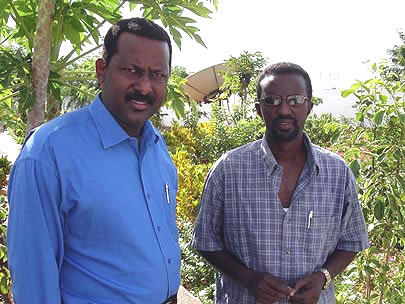
Farid Omar
Friday, August 24, 2007
 |
Canadian Ali Sharmarke (left) and Ahmed Abdisalam Adan, co-founders with Mohamed Elmi of HornAfrik, an independent news broadcaster in their native Somalia. Sharmarke was killed by a car bomb Aug. 11.
 |
The assassination of prominent journalists Ali Iman Sharmarke, a Somali Canadian, and his colleague, Mahad Ahmed Elmi, in the Somali capital of Mogadishu on Aug. 11 is a deliberate attempt by those behind the killings to stifle freedom of speech in Somalia and intimidate progressive journalists known for their neutrality.
This cowardly attack will not prevent efforts by Somali Canadians and the entire global Somali community to bring peace to their beleaguered nation. It will not silence the independent voices of dedicated journalists who work in difficult and often dangerous conditions to expose ongoing war crimes in Somalia by informing the Somali public, Canada and the world of the atrocities directed at the civilian population.
It is still not clear who masterminded the killings. But in recent months, the so-called transitional federal government (TGF) and its Ethiopian backers had on three occasions closed down HornAfrik and other media outlets that were critical of its ruthless campaigns against civilians opposed to both the unpopular government and the Ethiopian occupation.
The owner of Shabelle radio, another popular station in Mogadishu, recently told reporters he has been threatened by Ethiopian commanders for exposing war crimes in Somalia. In war-torn Mogadishu, Somali and foreign journalists continue to work in difficult circumstances, often facing censorship and threats of violence.
Formerly based in Ottawa, Sharmarke is the co-founder and director of the HornAfrik radio and television station in Mogadishu while Elmi was a popular radio host for HornAfrik. Sharmarke returned to Somalia in 1999. The other Canadian co-founder of Horn-Afrik, Ahmed Abdisalaam, currently lives in Toronto. They won the Canadian Journalists for Free Expression's International Press Freedom Award in 2002.
Elmi was gunned down by two assailants as he headed for work. A few hours later, Sharmarke was killed by an explosion from a car bomb as he drove home from Elmi's funeral. Two other Somali journalists, one working for Reuters and the other for Voice of America who were travelling with Sharmarke, were injured in the attack.
In his tribute to Elmi, Sharmarke said: "The killing was meant to prevent a real voice that described the suffering in Mogadishu to other Somalis and to the world."
HornAfrik – which also relays BBC Somali service programs – prides itself on its journalistic independence. According to the BBC, its broadcasts have in the past "angered both the government and Islamist opposition." Apart from running HornAfrik, Sharmarke had helped set up the Somalia Coalition for Freedom of Expression.
Prior to the killings, Hiiraan Online, a popular Somali news website, said that "there were attacks on media corporations and widespread abuse of members of the media in Mogadishu who were accused by the TFG of injecting `faulty' reports and news stories into the websites often referred to by the international community as a reliable source of information."
Abdi-Noor Hagi Mohamed, a Mogadishu-based Somali writer and filmmaker, said that Sharmarke's and Elmi's "fateful exit shall remain in the memory of Somali journalists, peace activists and media institutions."
In Toronto, CKLN Radio dedicated a full hour of programming on its Sunday evening shows to the fallen Somali journalists, highlighting the difficult circumstances such brave newsmen work in.
On the heels of the grisly killings, Human Rights Watch has just released a damning report on war crimes in Somalia that says the "worst abuses have been committed by Ethiopian soldiers, who are supporting the government against insurgents." The report also notes that the UN Security Council's indifference to this crisis has only added to the tragedy.
To date, the Canadian government has not issued any statement condemning the killing of the journalists. Now is time for it to step up efforts to demand justice for Sharmarke, a Canadian held in high regard by all Somalis and the journalistic community. Elmi's death also warrants equal attention.
Sharmarke and Elmi represented a true voice for the people. As Abdi-Noor said, "It is a voice of integrity that reverberates in the winds of truth and whose sound echoes in the air of liberty. No one can silence it with the use of force or at gunpoint."
All peace-loving people must demand immediate justice for the fallen heroes. It is time to rally behind all Somali journalists to ensure that Canada and the world are better informed on what is taking place in Somalia.
Farid Omar, a member of the Somali-Canadian Diaspora Alliance, is a research associate at the Centre for International and Security Studies at York University and a CKLN radio host.